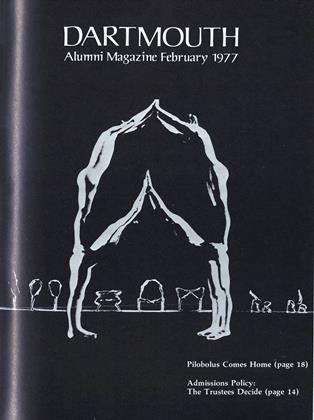Eleven Dartmouth professors (including one ex-) have combined their undeniable talents to produce this curious pudding, reminiscent of the one served to Winston Churchill, who stared at it and said, "This pudding lacks a theme." It is doughy in texture (the writers seem mostly to be wearing mittens, as befits a work produced on contract for the State Department), with one shining and nourishing plum tucked away in the middle: "Food and Population: Policies for the United States," by Donella H. Meadows, the principal writer of The Limits to Growth, who here employs once again those famous and diz- zying graphs with endlessly intertwining cycles, but who also breaks loose and expresses powerful personal convictions in clear and moving prose. Because it is the most (one resists saying the only) imaginative, original, and radical essay in the book, it is also the most realistic and sensible.
The other writers stay strictly within the system of perceptions, values, and expectations required for advancement in the Foreign Service in recent years, although Kalman Silvert (the ex-) has some sharp observations on "The Changing Dynamics of Hemisphere Politics," and Laurence I. Radway some biting ones on "Domestic Attitudes as Constraints on American Foreign Policy Leaders." For the rest, the late Louis Morton, to whom the volume is dedicated, writes routinely on nuclear proliferation, Michael P. Mazur on the international monetary order and on the developing countries, Kjell-Arne Ringbakk on multinational corporations, Nelson Kasfir on the Third World, especially Africa, Howard L. Erdman on India, and Donald L. McNemar on the UN.
Surely, you say, that's not the complete table of contents? Where is the Soviet Union? China? Japan? Western Europe? NATO? Not here, except obliquely in Gene Lyons's foreword and David Baldwin's introductory essay, a "Framework for Analysis," which argues persuasively for this kind of functional rather than geographical approach to an increasingly interdependent world. Still, the result is a bit like Hamlet without the prince. Polonius appears to be in charge here. But one hopes Mr. Vance will read Mrs. Meadows.
AMERICA INAN INTERDEPENDENT WORLDEdited by Professor David BaldwinUniversity Press of New England, 1976352 pp. Cloth, $12.50; paper, $6.50.
Mr. Bolte, recently employed in New York atthe Carnegie Endowment for InternationalPeace, has advanced to civilization in Maine,where he tries to make a living by writing inhumane letters.
 View Full Issue
View Full Issue
More From This Issue
-
 Feature
FeatureA simple mental technique... A simple mental tech... A simple mental... A simple...
February 1977 By PIERRE KIRCH -
 Feature
FeatureNever Let Go
February 1977 -
 Feature
FeatureTwelve legs, six imaginations, one soul Pilobolus
February 1977 By PHILIP HOLLAND -
 Feature
FeatureComposite Artist
February 1977 By M.B.R. -
 Article
ArticleStepping Out with a Bounder
February 1977 By D.M.N. -
 Article
ArticleGray Is Beautiful
February 1977 By ELIZABETH CRONIN '77
Books
-
 Books
BooksSCENERY FOR THE THEATRE: THE ORGANIZATION, PROCESSES, MATERIALS AND TECHNIQUES USED TO SET THE STAGE.
MAY 1972 By JOHN FINCH -
 Books
BooksContradiction
March 1981 By John S. Major -
 Books
BooksTHE BRITISH IN NORTHERN NIGERIA.
JANUARY 1970 By LEO SPITZER -
 Books
BooksON BEYOND ZEBRA!
December 1955 By MAUDE D. FRENCH -
 Books
BooksTHE ENORMOUS EGG.
May 1956 By MAUDE D. FRENCH -
 Books
BooksGOVERNMENT REGULATION OF BUSINESS: A CASEBOOK.
FEBRUARY 1966 By WILLIAM L. BALDWIN

